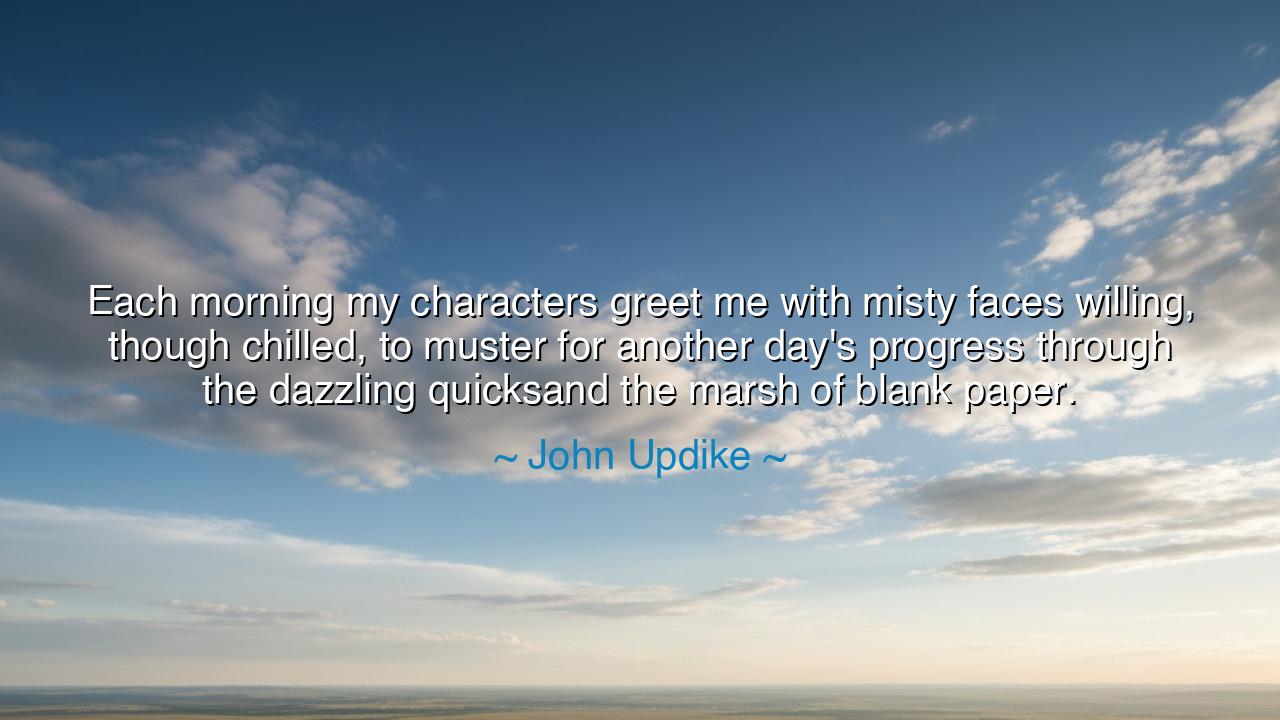
Each morning my characters greet me with misty faces willing
Each morning my characters greet me with misty faces willing, though chilled, to muster for another day's progress through the dazzling quicksand the marsh of blank paper.






In the words of John Updike, the craftsman of sentences and weaver of worlds, there resounds a vision both delicate and profound: “Each morning my characters greet me with misty faces willing, though chilled, to muster for another day’s progress through the dazzling quicksand, the marsh of blank paper.” This is no ordinary description of a writer’s task—it is a myth spoken in the tongue of the everyday, a testimony to the struggle and the triumph of creation. In this single sentence, Updike unveils the mystery of writing as both a burden and a blessing, both a fog of uncertainty and a light of discovery.
When he speaks of “characters with misty faces”, he names that fragile moment when ideas are half-born, their outlines blurred, hovering like spirits in the dawn. They are present, yet not fully formed, waiting for the breath of the author to grant them flesh. These misty beings stand before him not in rebellion but in loyalty, “willing, though chilled,” as though the cold of non-existence clings to them until the fire of the writer’s words can warm their bones. Here we see the sacred duty of the creator: to call the vague into the vivid, to give life where there was only shadow.
And then he names the battlefield: “the dazzling quicksand, the marsh of blank paper.” How well he knew that vast white plain, both inviting and treacherous! The blank page glimmers with possibility, dazzling like sunlight upon water, yet it threatens to swallow effort whole, like quicksand that grips the foot. Each word placed upon it is both a step forward and a danger of sinking. This is the paradox of creation—the struggle that every artist, poet, and builder of dreams must face: the emptiness before the work begins, and the courage it takes to break its silence.
So it was, too, for Michelangelo, who looked upon the unhewn marble block and declared that within it slumbered David, waiting to be freed. To all others, the marble was only stone—cold, unyielding, blank. But to the artist, it was quicksand and marsh, demanding struggle and patience, yet holding within it the glory of form. Day by day, chisel in hand, he carved progress, until the misty figure within the stone stood radiant. Updike’s characters upon the page are kin to Michelangelo’s David within the marble: both waited, both resisted, both demanded the courage of the hand to bring them forth.
The quote also speaks to discipline, for the writer does not wait for inspiration like a wandering guest; he rises each morning and meets his characters anew. This is a truth the ancients knew well: the farmer does not wait for perfect weather to till the soil, nor the soldier for a clear omen to train. Each day is the appointed time. So too with the writer, who sits before the marsh and quicksand of blank paper, not because it is easy, but because it is necessary. Creation is not the fruit of chance, but of repeated faithfulness.
From this, let the lesson be drawn: that progress is made not by conquering the marsh in a single stride, but by returning each morning, step by step, word by word. Your own “characters”—your duties, your projects, your visions—may greet you in mist, uncertain, not yet strong. Do not despair. Warm them with effort. Meet them daily, and their blurred outlines will sharpen into reality. The marsh may threaten to consume you, but only those who keep moving find solid ground.
Practically, let each soul who hears these words set aside a time each day for their craft, whatever it may be. Do not flee from the blank page, the silent canvas, the unshaped clay, the unbegun work. Approach it with patience, for in that emptiness lies hidden the form of greatness. Begin each day with small steps, and in time you will see what once was mist stand clear as a monument.
Thus, Updike’s words are not only the confession of a writer but the proclamation of a universal law: creation is born from facing the void with courage, again and again. The characters of our lives, though chilled, await us each morning. Let us greet them with steady hearts, press forward through the dazzling quicksand, and carve from the marsh of nothingness a work that endures.






AAdministratorAdministrator
Welcome, honored guests. Please leave a comment, we will respond soon